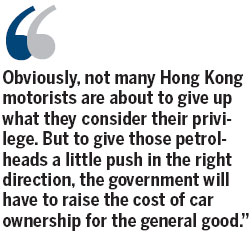Switch gear on car pollution
Updated: 2013-08-09 07:18
By Hong Liang(HK Edition)
|
|||||||||

Hong Kong's air pollution is getting worse, so it seems. Environmental officials said that the air pollution index in the past several days reached the highest levels since records began in 1999. It was considered a health hazard big enough to prompt the government to issue a public warning last week.
Worsening air pollution has been an issue of great concern to Hong Kong people for years. The government has said many times that addressing this health threat is one of its top priorities. But its efforts appeared to have produced few results.
This is unfortunate because the government is widely seen to have the power and means to cut down on air pollution. What it lacks is the political will and determination to introduce potentially controversial measures to fight pollution despite the fact its cause is clearly identifiable.
For a long time, authorities have been reluctant to blame the worsening air quality squarely on the proliferation of the auto population. Although readings have shown that the level of pollution on the busy streets is much worse than elsewhere, motor cars, for a long while, have largely escaped the blame.
We could only surmise that the authorities did not want to run the risk of stirring protests from the motoring groups. Apparently, there are many influential people in Hong Kong who love driving around in their flashy cars or SUVs. If you dare to stand at the top of Ice House Street, you see a constant stream of luxury cars and menacing SUVs passing on their way from the high-class residential complexes on Mid-Levels to the Central district. But don't watch for too long. The air is most foul at that spot.
But last week, the government appeared to have finally come to terms with reality when a senior environmental official broke the taboo by candidly naming the motor car as the perpetrator of foul air. But now that the government has openly identified the culprit, what happens next?
There is no official word yet, other than urging Hong Kong people to stay home as much as possible until the smog clears. Maybe a typhoon or two can help. But don't hold your hopes too high. When the wind stops blowing, the smog created by the cars will return.
Other than pure love for driving, it's hard to imagine why anyone would want to own a car in Hong Kong, which has one of the most efficient public transport systems in any major world city.
Driving in Hong Kong's congested streets is a chore. Seeing the many Ferraris and Porsches inching along in traffic behind the humble Volkswagens and Hondas makes one wonder where's the pleasure in owning a gas guzzling, noisy supercar in a city where too many cars share too few roads. And then there's the parking; a game of challenge designed specifically to frustrate and agitate the players. Of course, no one needs to play that game. Just leave the car at home, or better still, get rid of it.
Obviously, not many Hong Kong motorists are about to give up what they consider their privilege. But to give those petrol-heads a little push in the right direction, the government will have to raise the cost of car ownership for the general good. The overwhelming evidence of the danger of cars to public health is expected to speak sufficiently loud to cover the noise of objection from the die-hard car lovers and dealers, most of whom are associated with big businesses.
The government's sincerity in fighting air pollution is never in doubt. Its political will to do so is now put to the test by the record levels of smog choking the city. The government is simply running out of excuses this time.
The author is a veteran current affairs commentator.
(HK Edition 08/09/2013 page1)